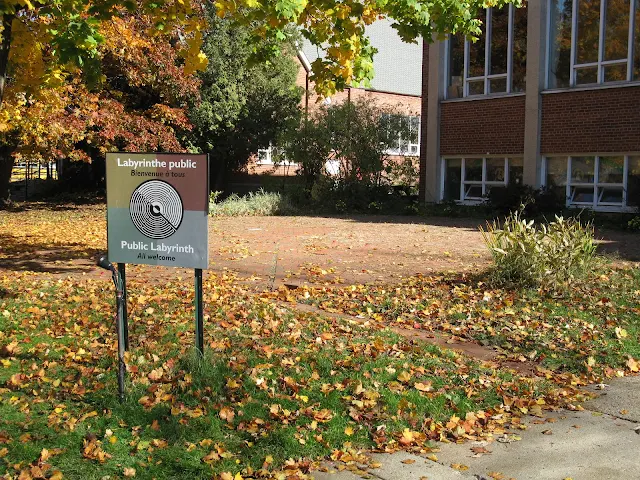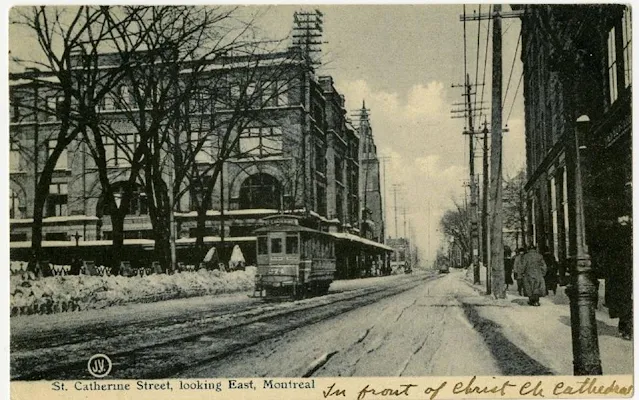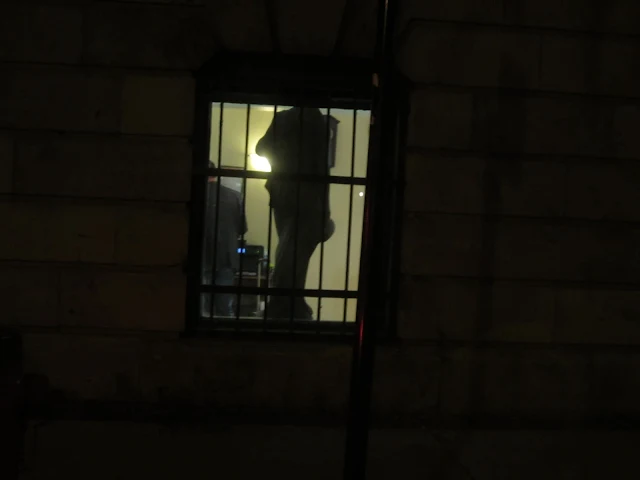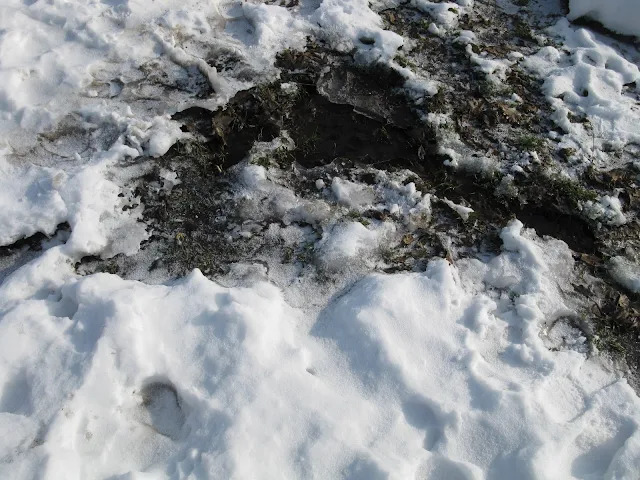Saturday, March 26, 2011
Lost, found, missing... (four)
Looking at these posters for lost, sometimes found, sometimes still missing pets--and occasionally missing people--the images taken in happier days become images of sadness, grief, and loneliness. A new context for presenting the image, in a poster, changes the meaning of the image from one of love and happiness to a context of loss.
We transform our pets into surrogate children, surrogate partners--we place a human burden on them--and yet, obviously, we don't value them as much as we value humans, there are few, or no posters for lost children. There is a poignancy to the images. As the image ages, it becomes damaged by water, faded by sunlight, and hope of finding the lost pet is diminished. The pet stares back at us, lost, sometimes found, missing.
Friday, March 25, 2011
Dr. William P. Morrissy of Greenpoint, Brooklyn
 |
Here is a photograph of Dr. William P. Morrissy of Greenpoint, Brooklyn, NY. The photograph is undated, an approximate date would be mid-1880s to mid-1890s. The photograph was sent to me by Anthony Sutherland. Dr. Morrissy was a nephew of my great great grandfather, Laurence Morrissey. William's brother, John Veriker Morrissy, was a Member of Parliament for Northumberland riding in New Brunswick. William was one of the first police surgeons for New York City. It is William's letter, written when he was a boy still living in New Brunswick, to Laurence Morrissey, by then living in Montreal, that contains so much information on the Morrissey family that the letter was saved for future generations; somehow it was even returned to the family in Newcastle (Miramichi), NB. More can be found on William at http://www.morrisseyfamilyhistory.com/. |
Thursday, March 24, 2011
Monday, March 21, 2011
Thursday, March 17, 2011
Monday, March 14, 2011
Thursday, March 10, 2011
Monday, March 7, 2011
Biography of Father Martin Callaghan
 |
| A drawing of Father Martin Callaghan when young |
 |
| Father Martin Callaghan in 1903 |
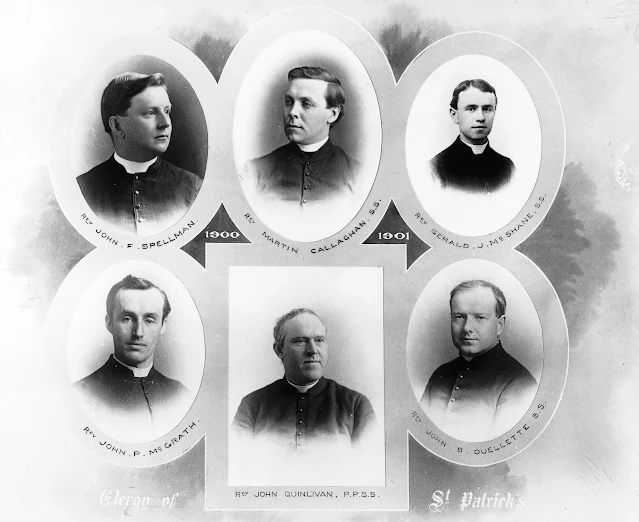 |
| Photo montage of the pastors at St. Patrick's Church, Montreal; Fr. Martin Callaghan, top middle |
Father Martin Callaghan
In 1915, upon returning to Montreal from Baltimore where he assisted at a funeral for another priest, Father Martin fell ill; this soon developed into congested lungs. Father Martin died on 10 June 1915 in his sixty-ninth year. His brother, Father Luke Callaghan, sang the mass at Father Martin's funeral. One booklet describes the funeral: "A large cortege of mourners accompanied his remains to their last resting place beneath the chapel of the Grand Seminary on Sherbrooke Street."
Father Martin was also an authority Canadian on folklore and for a number of years he was the owner of the Fleming Windmill, an historical landmark located in Ville LaSalle.
His obituary, published in the Montreal Star of 11 June 1915, states that, 'Father Martin,' as he was affectionately known to many, 'was a true Irishman in warmth of heart and breadth of sympathy. His gifts to charitable movements were countless, and many of his benefactions were known only to himself. The poor and needy always found him a ready listener to the story of their troubles.'
Here is an article on Fr. Martin Callaghan from 1915, I have just added the original image of this newspaper article below:
LATE FATHER CALLAGHAN
BELOVED PRIEST,
REV. M. CALLAGHAN
HAS PASSED AWAY
Formerly of St. Patrick’s
Well Known Throughout Province
Good Violinist
And Wrote Music
Authority on Canadian
Folklore—Gave Much
to Charity
The Reverend Martin Callaghan, former…. and [one of the] best known English speaking priests in the Province of Quebec, died last evening at the Hotel Dieu, after an illness of two weeks. He was sixty-nine years old.
Father Callaghan, whose career in the priesthood was long and useful, was born in Montreal, November 1846. He was educated, under the Rev. Father Mayer and the Sulpicians on Sherbrooke Street where after completing his studies he was professor of English for one year, having among his pupils Archbishop Bruchesi of Montreal and Archbishop Langevin of St. Boniface, and many men now prominent in the public life of this Province.
ST MARY’S CURATE
Father Callaghan studied theology under Rev. Fathers Levigne and Colin (?), and was ordained priest by the late Bishop Bourget. He was admitted a member of the Sulpician community in Paris, and began his ministry in Montreal as a curate of St. Mary’s under Father Campion. After one year at St. Mary’s he was appointed to St. Patrick’s under Father Dowd, and afterwards Father Quinlivan, succeeding the latter as pastor of St. Patrick’s. He served for a year under the Sulpician regime under Archbishop Bruchesi.
In December, 1907, after four years service as pastor of St. Patrick’s, Father … resigned to be…pastor…
Father Callaghan was well known as a musician. He was a violin pupil of Oscar Martel, violinist to the late King of Belgium. He was the author of many musical compositions, a number of which were rendered for the benefit of Montreal charities at various times. A deep student of Canadian folklore, his lectures on this subject had been enjoyed by thousands. “Father Martin,” as he was affectionately known to many, was a true Irishman in warmth of heart and breadth of sympathy. His gifts to charitable movements were countless, and many of his benefactions were known only to himself. The poor and needy always found him a ready listener to the story of their troubles.
GAVE AWAY LAND
A year ago he gave a piece of land in the parish of Lachine, which he had purchased some time before as a site for an English-Catholic college, to the Presentation Brothers, for a novitiate. The land was valued at $50,000. Later he gave the same community a site at Longueuil.
As a missionary priest Father Callaghan met with great success, his converts being numbered by thousands. He took special interest in work among the Chinese of Montreal. In collaboration with the Rev. Father Montanard, now serving with the French army, he prepared a Chinese-English catechism.
His brother, the Rev. Luke Callaghan, parish priest of St. Michael’s, was with him at the time of his death, as were his sister Mrs. Farrel, of Lachine, and Rev. Sister Morrissy, and assistants of the parish of Notre Dame.
 |
| Fleming Windmill, Montreal, 1900's |
Farmhouse and Fleming windmill, Lasalle, near Montreal, QC, about 1870
In 1815, William Fleming, a Scottish immigrant, built a stone house and a wooden windmill on his property in Lower-Lachine, facing Lac Saint-Louis, near Chemin du Roi (present-day LaSalle Blvd), which was a major thoroughfare and transportation route at the time. He ground barley and rice for local farmers who sold to the Montreal breweries. In 1816, Fleming decided to grind wheat. But this was in direct conflict with the Seigneurial rights of the Sulpician Seminary in Montreal, who had the monopoly on all flour-producing mills since 1663, requiring farmers to have their wheat ground by Sulpician mills for a fee. The Seminary, insisting on their rights, ordered Fleming’s mill to be demolished. Fleming’s lawyers replied that the Seminary had no legal power to rule in Canada. Their status was given by the Séminaire de Saint-Sulpice de Paris, which had no authority in Canada. In 1822,the King’s Bench ruled in favour of the Seminary and ordered non-regulation mills to be demolished. Fleming appealed the decision. Three years later, the eight judges of the Court of Appeal were unable to reach a majority decision, which constituted a victory for Fleming, since, in the absence of a decision, the Montreal Seminary could not force him to demolish his mill. William Fleming took advantage of the victory and decided to rebuild the mill in stone in 1827. He signed a building contract with the mason, William Morrison to build the stone windmill that stands to this very day. From 1827 to the 1880s the ownership and operation of the mill remained within the Fleming family. When William Fleming died in 1860, his son John took over operation of the mill. When activities ceased in the 1880s, the mill’s condition rapidly deteriorated. In 1892, the mill lost two of its blades and the rotating mechanism collapsed. At the turn of the century, the roof and the mechanism had fallen inside the building. After John Fleming’s death, his widow, Isabella Wylie bequeathed the property to Reverend Martin Callaghan, who later transferred the property to Reverend E.P. Curtin. In 1914, Curtin donated the mill to a religious community known as the Presentation Brothers of Ireland. In 1928, The Wellcome Foundation acquired the mill and the surrounding land from the Presentation Brothers of Ireland with the intention of establishing a pharmaceutical company in the area.
Around 1930, the mill and its internal mechanism were restored. As a result of the company’s efforts, the mill was saved from total destruction. In 1947, the City of LaSalle acquired the site from Burroughs Wellcome. Municipal authorities were more concerned about residential and industrial development than about heritage protection, and many old houses were demolished to make room for more modern buildings. In 1976, the Cavelier-de-LaSalle Historical Society convinced the city to apply to the Ministère des Affaires Culturelles du Québec, in order to have the mill recognized an official heritage site. They felt that their application was justified even if the millstones and the interior mechanism had disappeared without a trace. In 1982, the city of LaSalle adopted the mill as its official emblem and continued to put pressure on the Quebec government to accelerate the processing of the heritage recognition application. Finally, in 1983, the mill was officially classified as an archaeological heritage site by the Ministère des Affaires Culturelles du Québec. After being restored in 1990, it became a historical interpretation centre, open to the public every weekend during the summer. The Fleming Mill is the only windmill of Anglo-Saxon design with a device for turning its sails windward, still standing in the Province of Quebec.
Note: Edited 18 October 2025. This original 1915 newspaper article regarding Fr. Martin's death is below.
Revised: 13 November 2025
Saturday, March 5, 2011
F.R. Scott’s “central passion” was poetry
This quotation, by F.R. Scott, is taken from Sandra Djwa’s biography of Scott, A Life of F.R. Scott: A Life of the Imagination (Douglas & McIntyre, Vancouver and Toronto, 1989).
Thursday, March 3, 2011
A walk in NDG (two)
Outside the Loyola Chapel at Concordia University, this rowan tree is full of berries; after the first snowfall, I was surprised that most of the berries had fallen. November 16, 2010.
Tuesday, March 1, 2011
Winter or a river
in search of me. I don't know, I don't know where
it came from, from winter or a river.
"Poetry" by Pablo Neruda
(trans. Alastair Reid)
Pablo Neruda, Selected Poems
(Penguin Books, 1975, page 218-219)
Sunday, February 27, 2011
Holy Wells, Montreal (continuation)
Continuing my search for "holy wells," here is a view of water appearing through the earth and snow in Loyola Park in western NDG. See previous entries for more information on this site and the topic of "holy wells." The City of Montreal's error was locating their experimental ecological site in the wrong place, it should have been where the water appears on the surface of the earth.
Saturday, February 26, 2011
Beyond Truth Is Compassion
make us happy or feel joy;
if truth were happy,
none of us would lie,
none of us would dispute
the others truth.
What brings people together?
Not truth but compassion,
Monday, February 21, 2011
C.G. Jung and the importance of family history
Jung writes,
When I was working on the stone tablets, I became aware of the fateful links between me and my ancestors. I feel very strongly that I am under the influence of things or questions which were left incomplete and unanswered by my parents and grandparents and more distant ancestors. It often seems as if there were an impersonal karma within a family, which is passed on from parent to children. It has always seemed to me that I had to answer questions which fate had posed to my forefathers, and which had not yet been answered, or as if I had to complete, or perhaps continue, things which previous ages had left unfinished. It is difficult to determine whether these questions are more of a personal or more of a general (collective) nature. It seems to me that the latter is the case. (p. 233)
This is continued on page 236:
… it is precisely the loss of connection with the past, our uprootedness, which has given rise to the “discontents” of civilization and to such a flurry and haste that we live more in the future and its chimerical promises of a golden age than in the present, with which our whole evolutionary background has not yet caught up. We rush impetuously into novelty, driven by a mourning sense of insufficiency, dissatisfaction and restlessness. We no longer live on what we have, but on promises, no longer in the light of the present day, but in the darkness of the future, which, we expect, will at last bring the proper sunrise … The less we understand of what out fathers and forefathers sought, the less we understand ourselves, and thus we help with all our might to rob the individual of his roots and his guiding instincts, so that he becomes a particle in the mass, ruled only by what Nietzsche called the spirit of gravity.
Sunday, February 20, 2011
A walk in NDG (one)
Sunday, February 13, 2011
The Motel Raphael today...
Tuesday, February 8, 2011
Decarie Square (two)
Decarie Square is home to various stores, a Winners, Sear's Warehouse, a motor vehicle bureau, a big Corrections Canada parole office, a two dollar cinema, various rug and carpet stores, and so on, assuming these stores haven't closed by now. It is just off the Decarie Expressway, and is worth a visit. Most people think of this as a failed shopping mall, failed probably because of its location and the changing demographics of the area.










